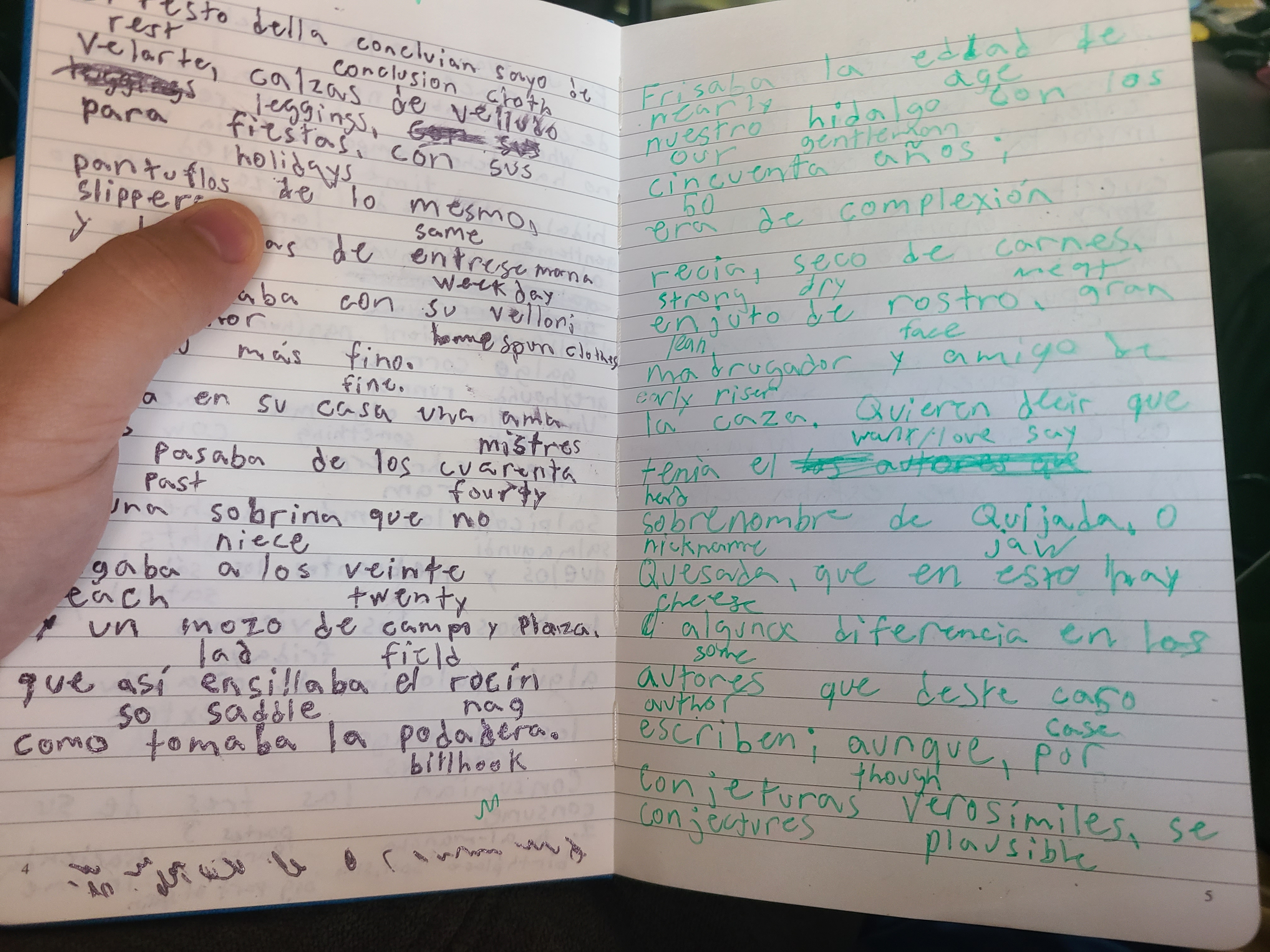I used the listening-reading method to learn Spanish (or to jump-start my Spanish, anyway). I thought I would post the link to the method and make some suggestions for books to read for others.
Listening-reading, by aYa/Phi-Staszek
What is Listening-Reading (LR)?
LR is a method. Read a book in English and listen to it in Spanish at the same time.§
§ Or any other target language.
This sounds difficult / impossible, but it works, and it gets easier with practice.
The trick is to read a sentence in English then listen to the Spanish. This is possible because you can (probably) read a lot faster than people can speak.
This is a rather efficient method because it exposes you to a lot of (comprehensible) words per minute.
You're supposed to use parallel texts. There are some here to get you started: Farkas Translations. You could also find the PDFs in English and Spanish for the same book. Or you could look here: Bilingual Fiction – warning: http link.
Personally, I prefer just to use a physical copy of the English book.
For the first 2-250 hours of LRing (see below), you want to use a few long books, which you will listen to more than once. aYa suggests 3 times. So you might LR a 33 hour book three times, which equals 100 hours.
Do the same for a second book, and you will likely be able to listen to the third book without relying on the English, especially if these are three (or more books) in the same series, by the same author (like Ken Follett: see below). (You may have to just listen to the third book twice or three times, but you will not need the English translation.)
Notes
aYa recommends 12 hour days over three weeks to jump from knowing only a summary of the grammar to reaching 'natural listening' (i.e. enjoying native content without (much) help).
'Natural listening' does not mean that you will understand everything, but you should understand enough to follow along, especially Marxist lectures (the content will be familiar to Lemmygradders; plus, anything in formal Spanish is easier to understand for native English speakers because formal English (as with formal Spanish) still mostly rely on words with Latin roots, and these formal words have not changed much).
(Enrique Dussel's lectures are easy enough to follow.)
LRing for 2+ hours per day works, too, although it will then take a little longer (i.e. a couple of months rather than 3 weeks) to enjoy native content without help (it still takes 2–250 hours of LRing to get to 'natural listening', so divide 250 by LR-hours-per-day for a rough estimate of how long it would take you).
Personally, I find I get into the flow after about an hour. And after that hour, it's like I'm in a new zone where Spanish just makes sense. So the longer 'chunks' that you can manage, the better. Probably.
I would not recommend jumping in without knowing much / any grammar, because knowing some grammar will help to make the audio more comprehensible. But, going back to more complex grammar explanations is a lot easier after doing LR and some reading.
Tips and Tricks
If you are a slower reader, you can read one page / paragraph first with the audio paused (so you know what is happening), then LR the same page / paragraph. Work out what works for you. When you start out, you may want to try this way first (reading a page at a time before LRing the same page) while you get the hang of it.
It helps to pick the right book. The link above includes 'levels' of books. You may want to start at the beginning and work your way up. Know, however, that the longer the book, the easier this will be. Because after 20–50 pages, you will have already encountered the most used words in the book. So the longer the book, the more repetition you will hear of words that you have already (partially) understood.
As for learning enough grammar to make the most out of LRing, start simple. Use the brief grammar explanations in the middle of / at the start / end of a Spanish-English dictionary. Or take a look at a phrase book.
Books that I enjoyed LRing
As for choosing a book to LR, Sally Rooney's Gente Normal (Normal People) is nicely narrated and a great novel. As is Dónde Estás, Mundo Bello (Beautiful World, Where are You). Rooney is a Marxist, too, and it comes through subtly in her writing.
Ken Follett's Las Tinieblas y el Alba (The Evening and the Morning) and Los Pilares de la Tierra (Pilars of the Earth) are good. Both narrated by Jordi Boixaderas, who is great. If you enjoy the books, there are two more in the series (I haven't read these yet). These novels talk about feudal England, which provides some useful vocabulary for those who want to jump into Marxist texts.
And if you get used to Boixaderas' voice, you may find it easier to then follow up with something by Isabel Allende as he narrates some of her work (Largo Pétalo de la Mar (Long Petal of the Sea – i.e. Chile) for example).
Another audiobook that was pleasant to LR was Phillip Pullman's El Libro de la Oscuridad I: La Bella Salvaje (The Book of Dust I: La Belle Sauvage).
Conclusion
aYa wrote:
I believe in learning a huge bit every minute.
Plenty of people can drive a car. L-R is Formula One.
Now you know what to expect.
And:
The most important things happen in your head.
Your emotions, your memories, the way you think, what you already know,
they are all holographic, everything happens at once.
You cannot show or describe how you really learn.
You can only write about some tricks or tools, and that’s about it.
This is not magic, but it does work, and it's quite enjoyable because you can jump straight into content that you could otherwise enjoy in English. You will likely need to study some grammar afterwards, especially if Spanish is your first second language. And it still takes a long time to become 'fluent' (whatever that means). But LR seems to speed up the process of getting to an intermediate level. It did for me, anyway.
I'm happy to answer questions, although you may find most of your questions answered in the website that aYa wrote in the link, above.
Hope this helps someone.


